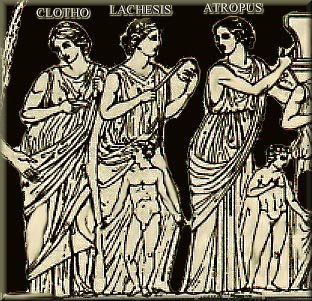In classical mythology the three Fates (Moerae) were goddesses believed to determine a person's fate when he or she is born. They worked together to set the course of a person's life and determine his or her final end. Clotho spins the thread of life, Lakhesis measures out each person's days, and Atropos cuts the thread and chooses how and when a person is fated to die.
Agency is a philosophical term that refers to how free a person is to act independently in the world and have their choices influence the world. Free will is related to agency, but isn't exactly the same thing. Free will is how much control people have over their thoughts, choices, and actions from among a variety of options. This distinction is important, because someone could believe she has a strong degree of agency in her life (control over her choice of a spouse for example), but also still believe she was "destined" to meet that spouse, and also believe that meeting that special person was determined by things mostly outside her control (career/education/geography/time period & life span/etc.)
Using textual evidence, explain how you see fate, agency, and free will functioning in other parts of The Odyssey thus far. How do these representations of fate, agency, and free will resonate and/or clash with your understanding of 21st century life and beliefs? Do you think most people now believe in destiny or champion free will? Or is this too simple a question? Do contemporary beliefs fall somewhere in between?
